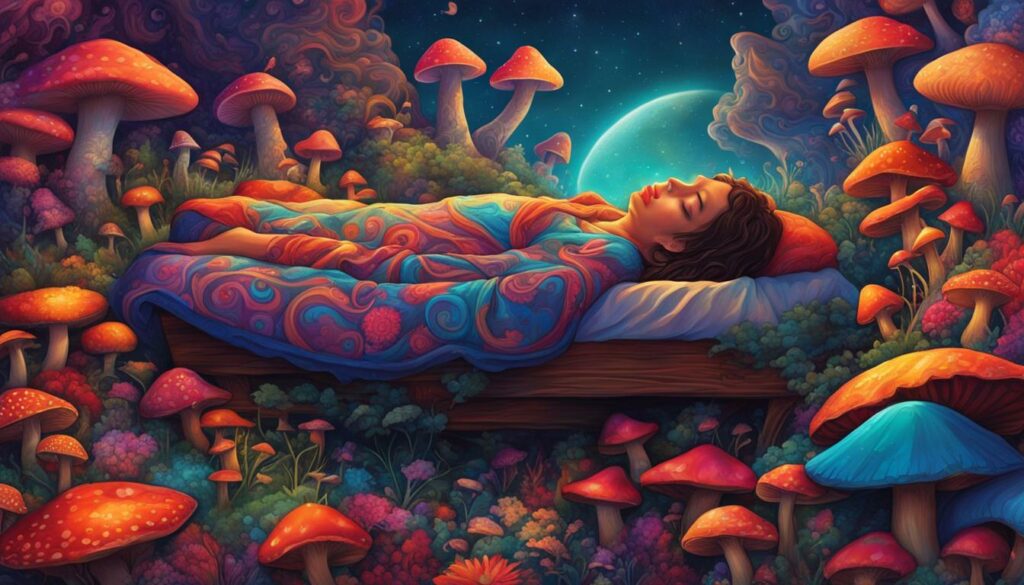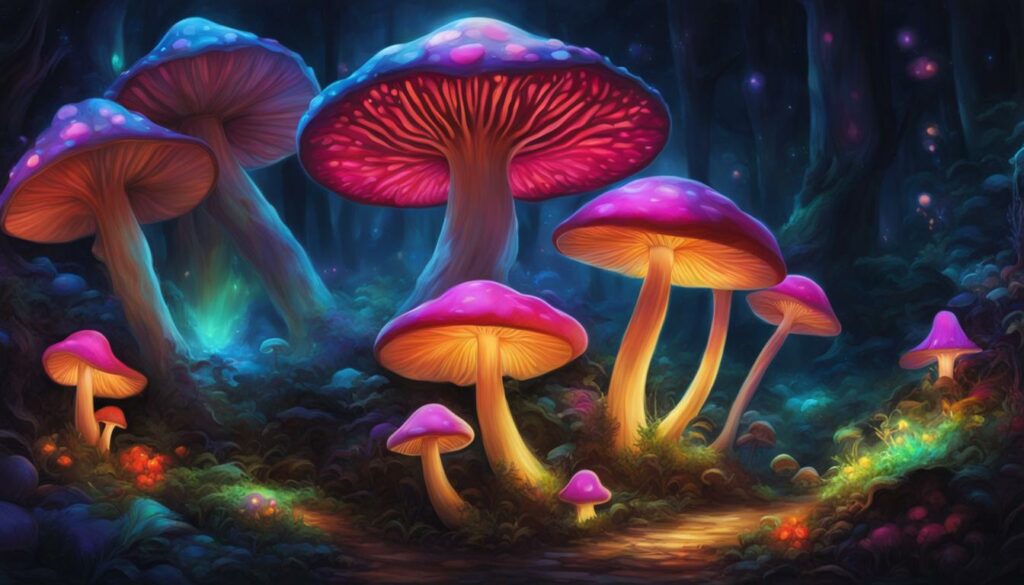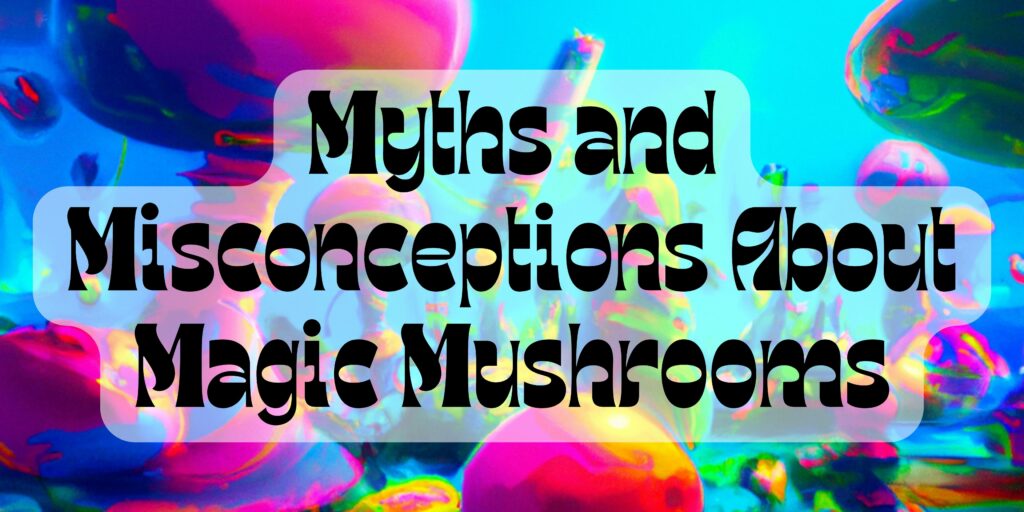Psilocybin mushrooms, also known as “shrooms,” have gained popularity for their hallucinogenic effects. But what about their impact on sleep? Many people wonder if consuming these mushrooms can keep them awake or disrupt their sleep patterns. Let’s explore the effects of shrooms on sleep and gain a better understanding of how they may affect our rest.
Key Takeaways
- Psilocybin mushrooms can have a complex impact on sleep patterns and vary from person to person.
- While some studies suggest that shrooms may improve sleep by reducing anxiety and improving mood, other research indicates that they can disrupt sleep cycles, causing insomnia and restlessness.
- Psychoactive compounds in shrooms can induce a state of wakefulness, potentially leading to sleep disturbances and sleep deprivation.
- Studies show that psilocybin alters serotonin activity, which plays a crucial role in regulating sleep, and can impact important sleep stages like REM sleep.
- Using shrooms as a sleep aid may carry risks and potential negative impacts on sleep quality and overall well-being.
The Connection Between Psychedelics and Sleep
Neuroscientists have been delving into the fascinating relationship between psychedelics and sleep, particularly focusing on the effects of the primary psychoactive chemical in magic mushrooms – psilocybin. Research has highlighted the impact of psilocybin on serotonin receptors in the brain, which play a crucial role in sleep and mood regulation. This connection has led to the exploration of how psilocybin can alter sleep patterns and potentially affect sleep quality.
A key finding is that psilocybin can promote slow-wave activity (SWA), which is associated with deep sleep and essential for memory consolidation and emotional regulation. This suggests that psilocybin may have potential benefits for sleep by enhancing the quality of deep sleep. However, it’s important to note that psilocybin can also prolong REM sleep latency, which can disrupt the sleep cycle and impact overall sleep duration.
Table: Effects of Psilocybin on Sleep
| Sleep Aspect | Effects of Psilocybin |
|---|---|
| Slow-Wave Activity (SWA) | Promotes deep sleep, potentially improving memory consolidation and emotional regulation. |
| REM Sleep Latency | Prolongs the time it takes to enter REM sleep, potentially disrupting the sleep cycle. |
There is ongoing debate regarding the potential benefits of microdosing with psilocybin for sleep. Some individuals believe that microdosing may indirectly improve sleep by reducing symptoms of mental health disorders. However, more research is needed to fully understand the impact of microdosing on sleep and to determine safe and effective dosages.
Quote: “Research suggests that psilocybin can have complex effects on sleep patterns, potentially enhancing deep sleep while also disrupting REM sleep. Further studies are needed to explore the therapeutic potential of psychedelics for sleep improvement and to better understand the optimal dosages and timing.”
The Effects of Psilocybin on Sleep Patterns
Psychedelic drugs, including psilocybin, can disrupt normal sleep patterns by modifying serotonin activity, a neurotransmitter that plays a role in regulating sleep. Psilocybin can prevent the brain from entering into REM sleep, which is the deepest and most restful stage of sleep. This can negatively impact memory, learning, and thought processes. Psilocybin can also lead to tolerance, requiring higher doses to achieve the same effects, potentially further impacting sleep. Additionally, psilocybin has been found to impair the quality of deep sleep brain waves, suggesting it may make it harder to sleep in the long term. Understanding these effects is crucial in determining the impact of psilocybin on sleep.
The Role of Serotonin in Sleep Regulation
Serotonin, a key neurotransmitter in the brain, helps regulate sleep-wake cycles and plays a crucial role in determining the quality of sleep. Psilocybin affects serotonin receptors, altering the activity of this neurotransmitter and influencing sleep patterns. By modifying serotonin activity, psilocybin can disrupt the natural sleep cycle, leading to sleep disturbances and impairing the overall quality of sleep.
Impact on REM Sleep and Deep Sleep
Psilocybin has been shown to decrease rapid eye movement (REM) sleep, the phase associated with dreaming and emotional processing. This disruption can have long-term effects on mental and emotional well-being. Additionally, psilocybin can impair the brain’s ability to achieve deep sleep, resulting in reduced cognitive function and impaired memory consolidation. These changes in sleep patterns can have significant consequences for overall sleep quality and the body’s restorative processes.
| Effects of Psilocybin on Sleep Patterns | Summary |
|---|---|
| Disruption of REM sleep | Psilocybin inhibits REM sleep, impacting dreaming and emotional processing during sleep. |
| Impairment of deep sleep | Psilocybin impairs the brain’s ability to achieve deep sleep, resulting in reduced cognitive function and impaired memory consolidation. |
| Tolerance and higher doses | Regular use of psilocybin can lead to tolerance, requiring higher doses to achieve the same effects, potentially further impacting sleep. |
| Long-term sleep difficulties | Psilocybin may impair the quality of deep sleep brain waves, making it harder to sleep in the long term. |
The Impact of Psychedelics on Sleep: Debunking Myths
There is a common belief that psilocybin, the psychoactive compound in magic mushrooms, has calming effects and can improve sleep. Some individuals associate these calming effects with spiritual practices. However, scientific research has yet to provide substantial evidence to support these claims. Instead, studies suggest that psilocybin can induce a state of wakefulness, leading to insomnia and restlessness, making it less ideal for sleep. The physical and mental stimulation caused by psilocybin can disrupt sleep patterns and make it difficult to relax and fall asleep.
Recreational use of psilocybin- the use of magic mushrooms without therapeutic purposes- as a sleep aid is also not supported by scientific research. While some individuals may subjectively perceive improved sleep after using psilocybin recreationally, the potential benefits are likely due to a placebo effect rather than direct sleep-enhancing properties of the drug. It is important to note that using psychedelic substances for non-medical purposes carries potential risks and should be approached with caution.
On the other hand, microdosing with psilocybin has become a popular practice and is believed by some to offer sleep benefits. Microdosing involves taking small, sub-threshold doses of psilocybin that are unlikely to induce hallucinations or other psychoactive effects. Proponents of microdosing claim that it can indirectly improve sleep by reducing symptoms of mental health disorders such as anxiety and depression, which are often associated with sleep disturbances. However, scientific evidence supporting these claims is limited, and more research is needed to determine the efficacy and safety of microdosing for sleep improvement.
“The potential benefits of using psychedelics for sleep should be approached with caution and based on scientific evidence rather than anecdotal reports.”
Table: Comparing Recreational Use and Microdosing of Psilocybin for Sleep
| Recreational Use | Microdosing | |
|---|---|---|
| Effect on Sleep | May disrupt sleep patterns and induce wakefulness | Claimed to indirectly improve sleep by reducing symptoms of mental health disorders |
| Evidence | Limited scientific evidence, mostly anecdotal reports | Limited scientific evidence, more research needed |
| Risks | Potential for disrupted sleep, altered emotional states | Potential risks associated with long-term use and unknown effects |
In summary, the belief that psilocybin has calming effects and can improve sleep is not fully supported by scientific research. While recreational use of psilocybin as a sleep aid is not recommended, microdosing with psilocybin is a topic of ongoing research. It is important to approach the potential benefits of using psychedelics for sleep with caution and based on scientific evidence rather than anecdotal reports. Furthermore, the risks associated with these substances should be carefully considered before use.
The Risks of Taking Shrooms Before Bed
Taking microdoses of psilocybin mushrooms before bed can pose risks to sleep quality. Even small doses of psilocybin can disrupt the delicate balance necessary for a good night’s sleep. The psychoactive effects of mushrooms can induce altered emotional states, heightened introspection, and enhanced sensory awareness, which may make it too challenging to relax and unwind before sleep.
These altered states of consciousness can lead to difficulties falling asleep and disrupted sleep patterns. The heightened perception and susceptibility to stimuli can make it hard to create a state of peace and tranquility necessary for sleep. It is important to consider these risks before using psilocybin mushrooms as a sleep aid.
“The psychoactive effects of mushrooms can induce altered emotional states, heightened introspection, and enhanced sensory awareness, which may make it too challenging to relax and unwind before sleep.”
Additionally, the effects of psilocybin on sleep quality can vary greatly from person to person. While some individuals may find improved sleep or enhanced emotional processing, others may experience disrupted sleep patterns and altered emotional states. It is crucial to approach sleep on mushrooms cautiously and consider the potential risks involved.
The Risks of Taking Shrooms Before Bed
| Risks | Effects |
|---|---|
| Disruptions to sleep patterns | Difficulty falling asleep and staying asleep |
| Altered emotional states from shroom effects | Heightened introspection and sensory awareness |
| Difficulty relaxing and falling asleep after shrooms | Challenges in creating a state of peace and tranquility for sleep |
Sleep and Shrooms: The Experience and Potential Benefits
While it is possible to fall asleep under the influence of mushrooms, it may be more challenging than usual, especially if taken shortly before bed. The effects of psilocybin can promote alertness and wakefulness initially, making it less ideal for sleep. However, some individuals may still fall asleep while under the influence of psilocybin. Sleeping while on mushrooms can potentially facilitate emotional processing and allow for increased introspection in the dream space. Some people have reported improved sleep after microdosing mushrooms, and there are anecdotal reports of experiencing vivid colors and lucid dreams while on psilocybin. However, individual experiences can vary, and it is important to approach sleep on mushrooms cautiously.

The Potential Benefits of Microdosing Mushrooms for Sleep
Microdosing mushrooms, or taking very small doses of psilocybin, has gained popularity for its potential benefits on various aspects of well-being, including sleep. While scientific research on the specific effects of microdosing mushrooms on sleep is limited, some individuals have reported improved sleep quality after microdosing. These benefits may be attributed to the potential mood-enhancing and anxiety-reducing effects of psilocybin, which can help promote relaxation and a sense of calm before sleep. Additionally, microdosing mushrooms may facilitate emotional processing during sleep, allowing individuals to gain insights and clarity on their thoughts and feelings. However, it is important to note that individual experiences can vary, and more research is needed to fully understand the impact of microdosing mushrooms on sleep.
The Impact of Shrooms on Dreaming: Lucid Dreams and Emotional Processing
One intriguing aspect of using psilocybin mushrooms is their potential impact on dreaming. Many individuals report experiencing vivid and intense dreams while on psilocybin, with some even achieving lucid dreaming, where they become aware that they are dreaming and can actively participate in and control the dream. This can offer a unique opportunity for emotional processing during sleep, as individuals may have heightened introspection and increased access to their subconscious thoughts and emotions. However, the intense and potentially unpredictable nature of psychedelic experiences can also lead to emotionally challenging or unsettling dreams. It is essential to approach these experiences with awareness and caution, and to create a safe and supportive environment for exploration.
Summary
Sleeping while on mushrooms can be challenging due to the initial alertness and wakefulness promoted by psilocybin. However, some individuals may still fall asleep under the influence of psilocybin, and this can potentially facilitate emotional processing and vivid, intense dreams. Microdosing mushrooms, in particular, has been reported to improve sleep quality and enhance emotional well-being. It is important to approach sleep on mushrooms cautiously and be aware of the individual variations in experiences. Further research is needed to fully understand the impact of psilocybin on sleep and to determine safe and effective ways to use mushrooms for sleep improvement.
Conclusion
In conclusion, the effects of psilocybin on sleep are complex and highly individualized. While some individuals may experience improved sleep or enhanced emotional processing, others may encounter disrupted sleep patterns and altered emotional states. It is important to carefully consider the risks and benefits before using psilocybin mushrooms as a sleep aid.
Research suggests that psilocybin mushrooms can cause disorientation and confusion, potentially leading to insomnia and restlessness. The psychoactive compounds in mushrooms can induce a state of wakefulness, making it challenging to fall asleep and maintain a restful sleep throughout the night.
Although some studies have shown that psilocybin can promote slow-wave activity associated with deep sleep, it can also prolong REM sleep latency, potentially disrupting the sleep cycle. Furthermore, the altered perception and heightened susceptibility to stimuli while under the influence of psilocybin can make it difficult to relax and create an optimal sleep environment.
While there may be anecdotal reports of improved sleep after microdosing mushrooms and experiencing vivid colors and lucid dreams, further research is needed to fully understand the impact of psilocybin on sleep and to determine safe and effective ways to use psychedelics for sleep improvement.
FAQ
Do psilocybin mushrooms keep you awake?
Psilocybin mushrooms can disrupt sleep patterns and cause difficulties falling and staying asleep.
What is the connection between psychedelics and sleep?
Psychedelics, such as psilocybin, can affect serotonin receptors in the brain, altering sleep and mood.
How does psilocybin affect sleep patterns?
Psilocybin can promote deep sleep but also disrupt REM sleep, potentially impacting the sleep cycle.
Are there any benefits of using psychedelics for sleep?
The benefits of microdosing psilocybin for sleep are debated, with limited scientific evidence to support it.
Are there any risks of taking psilocybin before bed?
Taking microdoses of psilocybin mushrooms before bed can disrupt sleep quality and make it challenging to relax and fall asleep.
Can you fall asleep on mushrooms?
While it is possible to fall asleep under the influence of psilocybin mushrooms, the effects of psilocybin can promote alertness and wakefulness, making it more challenging.
What is the impact of psilocybin on sleep?
Psilocybin mushrooms can affect sleep patterns differently for each individual, with some experiencing difficulties falling and staying asleep.




